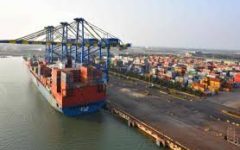 Vipin Vohra, Chairman, Continental Carriers focuses on trade regulations and asserts, “Changing trade policies can have significant impacts on global supply chains in air freight. Tariffs and Trade Barriers: If trade policies impose tariffs or other barriers on certain goods, it could lead to changes in the volume and direction of air freight shipments. Higher tariffs may make certain products more expensive to import/export, leading to a shift in demand for air freight services. Businesses would expect the Indian government to communicate any changes to trade policies in advance and to consult with stakeholders in finalizing the cargo tariff and other related issues which have potential impact on the air freight industry.
Vipin Vohra, Chairman, Continental Carriers focuses on trade regulations and asserts, “Changing trade policies can have significant impacts on global supply chains in air freight. Tariffs and Trade Barriers: If trade policies impose tariffs or other barriers on certain goods, it could lead to changes in the volume and direction of air freight shipments. Higher tariffs may make certain products more expensive to import/export, leading to a shift in demand for air freight services. Businesses would expect the Indian government to communicate any changes to trade policies in advance and to consult with stakeholders in finalizing the cargo tariff and other related issues which have potential impact on the air freight industry.
Route Optimization: Air freight carriers may need to optimize their routes and operations in response to changing trade policies. This could involve rerouting flights to accommodate shifts in demand. Multiple dipping by the Air Freight carriers, subject to permission, may also be considered to explore the potential for Air Freight from Tier II and Tier III cities.
Infrastructure Development: The Indian government may be expected to invest in infrastructure to support the growth of the air freight industry, including the expansion of airports, the modernization of air traffic control systems, and the development of cargo handling facilities.
Creation of Off Airport locations for Air Cargo handling activities to reduce logistics cost and congestion during peak period at the Air Cargo Terminals at IGI Airport. Overall, businesses operating in the air freight industry would look to the Indian government to create a conducive environment for the growth of trade and investment, while also addressing any challenges or disruptions caused by changing trade policies.”
Breaking News
- Global air cargo demand grows, momentum softens toward 2026
- ₹1,615 cr rail cargo terminal approved near Ramayapatnam Port
- Mysuru Airport set for upgradation to handle B737 and A320 aircraft
- Odisha to get seven new cargo terminals to boost logistics ops
- ₹850 Crore MMLP Planned at Nashik
- Menzies Aviation Achieves Cargo iQ Certification
- ‘Powering growth with tech, clean energy and AI’
- Allcargo Logistics Expands Reach to Cover 100% of India’s PIN Codes
- ‘Domestic Cargo Absorbs FDTL Shock, but Schedule Sensitivities Persist’
- ‘Limited belly capacity deepens domestic cargo volatility’
- ‘Belly cargo crunch likely to last through 2026’
 Cargo Breaking News
Cargo Breaking News


